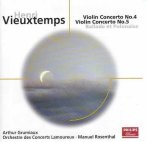Arthur Grumiaux was one of the last great violinists to treat Vieuxtemps’ concertos as musically appealing, sincere compositions and not merely as bravura vehicles. This fact sets his accounts of Nos. 4 and 5 apart from most rivals, and he plays throughout with impeccable refinement and taste and with obvious affection for the music. The accompaniments by the Lamoureux Orchestra under Manuel Rosenthal are no less attentive to detail, although these mid-1960s recordings don’t equal Philips’ best from the period, revealing some congestion in loud tuttis.
Concerto No. 4 is eloquently played; Grumiaux’s vibrato is perfectly controlled and there’s little recourse to glissando, so the overall effect is less highly colored than Perlman’s flamboyant 1976 Paris Orchestra version for EMI. Because it’s not as showy, Grumiaux’s un-mannered performance actually heightens the devotional atmosphere of the first movement, and the scherzo affords a splendid demonstration of the violinist’s virtuosity in full flight. The finale, a march, is easier to bring off, and it rarely fails on disc, but in Perlman’s version (as usual in his EMI recordings from the 1970s) he’s forwardly balanced and closely miked, so string noise and position changes are plainly audible. By contrast, Grumiaux sounds smooth as silk, unruffled even at the most demanding moments.
Listeners used to hearing Perlman in Concerto No. 5 again will find Grumiaux’s rendition more understated. His clear-cut, straightforward approach carries less of the patrician, epic style you’d normally expect in a concerto from the 1860s. Still, this is some of the classiest playing you’re likely to hear in this work, with the cadenza at the end of the first movement yielding nothing to Perlman’s or even Heifetz’s, whose 1961 RCA account with Sargent is better engineered. And where most performances treat the three-minute Adagio as little more than an entr’acte (giving the soloist time to catch his breath before the challenging but very short finale), Grumiaux invests it with a depth and gravity of expression that’s unequalled elsewhere, and his finale is technically dazzling too, even if slower than Heifetz’s. The filler, a spirited and brilliant 1974 reading of the Ballade et Polonaise with pianist Dinorah Varsi completes this engrossing reissue.
































